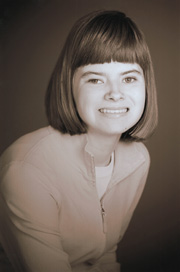 To most people, Sarah Weidner seems like any other 13-year-old. She goes to school, participates in Girl Scouts and visits with her friends.
To most people, Sarah Weidner seems like any other 13-year-old. She goes to school, participates in Girl Scouts and visits with her friends.
What most people do not know is that Sarah was born with “severe hydrocephalus,” a condition that causes a dangerous buildup of fluid around the brain. In fact, doctors did not expect Sarah to survive, let alone see, hear or speak. Understandably, doctors at the Munroe-Meyer Institute (MMI) at UNMC are thrilled to see Sarah leading the normal life of a 13-year-old girl today.
It is in honor of this extraordinary success that Sarah’s grandfather, William Leopard of Sioux Falls, S.D., established the Sarah Weidner Grant Fund at the University of Nebraska Foundation with a donation of $100,000. The fund will provide financial assistance to families so they may participate in any UNMC Munroe-Meyer Institute Recreational Therapy Program activity.
“I made the gift because of my granddaughter,” Leopard said. “She really likes to be there (MMI) and it has done a lot of good for her, helping her improve over the years. I also wanted to do something to help the school. I have taken her there and picked her up and understand how much she really enjoys it.
“She is in seventh grade this year and doing well, remarkably well for a child who has had nine surgeries before the age of three.”
The MMI Recreational Therapy Program allows people with developmental disabilities to escape the warehouse-like institutions of the 1960s and receive the necessary health care in more home-like environments, said Dr. Michael Crawford, Ph.D., director of the program. Since the program receives no government funding, all of its activities are supported exclusively by private funds, he said.
Gifts such as Leopard’s create access to the Recreational Therapy Program for participants and their families, nearly one-third of whom live below the poverty level.
“This will allow us to help many more families and for the first time help families with adult children with development disabilities,” Dr. Crawford said. “Recreational services remain a very underdeveloped part of developmental disability therapy. However, this program allows citizens to stay in the community, adding to the quality of life. In Omaha, the Munroe Meyer Institute is the only place in the city where families can find these services.”